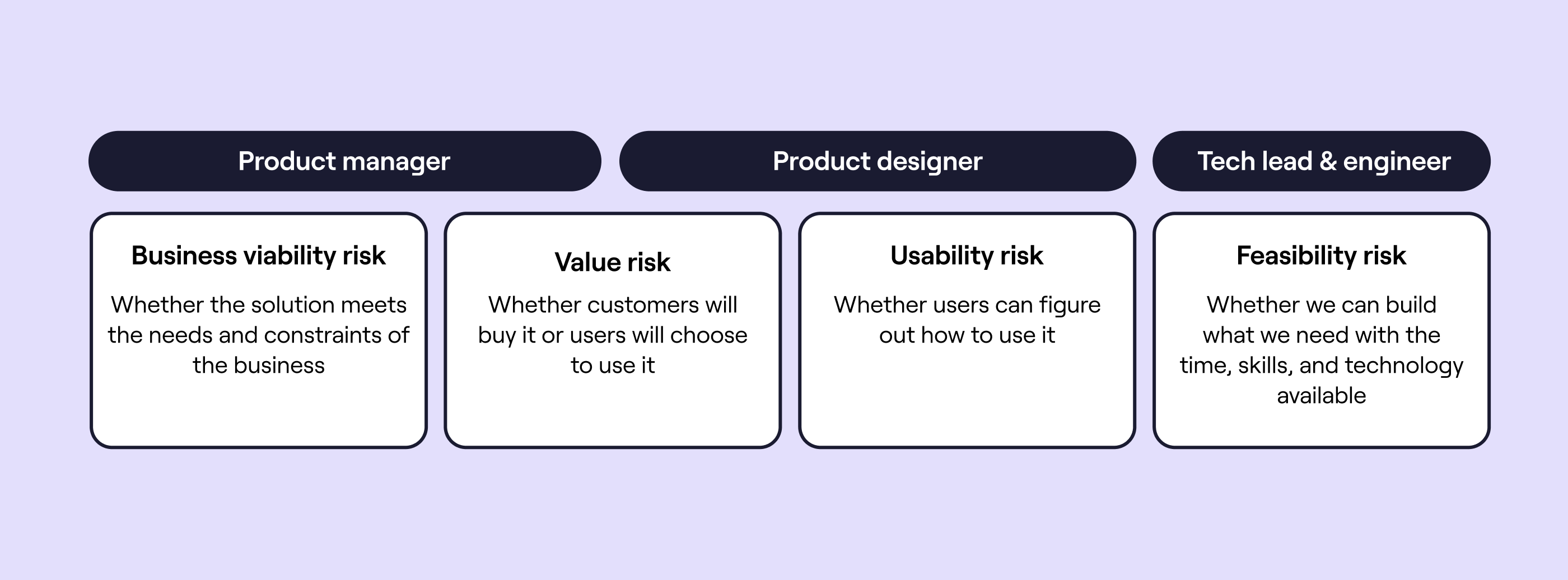Everything you need to know about our people
Our people are our product and the heart of our business. We hire the best in the industry to make sure we don’t just meet our clients’ expectations, we exceed them.
We have three distinct roles at Hyperact, centred around the core skills needed to make great digital products:
Each of these roles is responsible for tackling a specific area of risk associated with product development:
- Value
- Viability
- Usability
- Feasibility

Without one of these key risks being covered and actively managed, it’s unlikely that your product will scale successfully.
While the responsibilities of each role are different, all of our consultants share the same set of values and characteristics:
Below we go into more detail about what each of these means, why they’re important to us, and how they provide value to our clients, as well as answering some common questions.
Roles
📈 Product consultants
Product consultants are responsible for ensuring a product meets user needs (value risk), and that the solutions developed by the product engineers work for the wider organisation (business viability risk).
They play a lead role in creating a product team’s vision and strategy, defining objectives and key results, and driving the team towards successful outcomes.
Main responsibilities:
Product management
- Defining the product and coordinating actions across an organisation to enable its success.Business analysis
- Identifying business needs and determining solutions to business problems.Delivery management
- Unblocking the team, and managing the lifecycle of software delivery.Data analysis
- Inspecting, cleansing, transforming, and modelling data to create meaningful insights.ProductOps
- Optimising the feedback loops, processes and practices related to product management across an organisation.
👩🎨 Design consultants
Design consultants ensure that users can figure out how to use products (usability risk) and that it has a compelling value proposition (value risk).
They design everything from the high-level service experience across all channels to high-fidelity prototypes of individual interactions and make sure that design gets translated into working software.
The designer is also responsible for user research. They ensure that users’ needs are collectively understood, that they’re actively involved in the development of a solution, and that problems are framed from their perspective.
Main responsibilities:
Product design (UX/UI)
- Designing intuitive user journeys and interactions.Service design
- Designing whole services, end-to-end, front-to-back, and across all channels.Content design
- Crafting simple, clear, and engaging content.User research
- Planning, conducting, and analysing quantitative and qualitative user research.DesignOps
- Maximising the impact of design by aligning people, tools, and processes.
⚙️ Engineering consultants
Our engineering consultants focus on understanding how to turn design into scalable products through software engineering (feasibility risk).
They work across the full technology stack, from infrastructure to front-end, to develop and ship resilient, scalable, modular, automated, and interoperable software.
Main responsibilities:
Full-stack engineering
- Creating solutions and writing code across the front end, back end, and infrastructure layers.Solution architecture
- Designing the technical elements of a solution, from the choice of technologies (tech stack) to specific design patterns.DevOps
- Optimising people, tools, and processes to deliver software at high velocity.Test automation
- Writing automated tests, running tests, managing test data, and utilising results to improve software quality.Data engineering
- Designing and building systems for collecting, storing, and analysing data.
Values
We have three simple, unique values at Hyperact that guide our everyday actions:
🔎 Total transparency
We make everything open by default, from how we work, to our commercial arrangements, and our environmental and societal impact. We hold ourselves accountable and create a culture that promotes open and honest feedback.
🎯 Ruthless focus
Getting to market quickly and scaling effectively requires a ruthless focus on value. We’re constantly asking ourselves, “Is this the most valuable thing we could be doing right now?” based on the value it delivers to your users and business.
✋ Collective responsibility
We have a saying, “everyone is responsible for everything”. We hire people who uphold high standards and routinely assume responsibility for areas outside of their remit.
There are many other values that are still important to us, like integrity, pragmatism, and technical excellence, but we feel they should be expected of any modern consultancy.
Characteristics
These are common characteristics we see in high-performing product teams members and look for when we’re hiring new consultants:
🧠 Product minded
They get ‘product’ and prioritise finding the best approach to serving users in a way that generates desired business outcomes.
✝️ T-shaped
They can cover several related specialisms, while also possessing a good understanding of the other roles within the product team.
🚀 Proven deliverer
They have a proven track record of delivering products to market. Plans, prototypes, and PowerPoints all serve their purpose. But there is a unique set of skills and level of determination needed to make sure those artefacts don’t just end up collecting dust in a draw.
FAQs
Everyone says they have ‘the best’ people. What does that actually mean?
Our consultants have:
- an average of 12 years of industry experience.
- a professional certification in their field.
- experience delivering in product-led organisations.
- the unique characteristics needed to create successful digital products.
I need a specialist role for my team, do your consultants have deep enough experience to do that?
Yes. While our consultants can cover an unusually broad set of specialisms, they can perform each of those specialisms to a level we would expect in a high-performing product team.
How do you charge for your consultants' time?
We charge for our services on a time and materials basis. Each of our consultants is charged at a standard day rate according to their level and experience.
Can I vet candidates before joining my team?
Yes. We always provide CVs of our candidates and can arrange additional meetings and interviews if needed.
What happens if a consultant doesn’t meet my expectations?
In the unlikely event that you aren’t satisfied with the performance of one of our consultants, we have a process to help resolve the situation. First, we’ll see if the situation can be resolved through feedback and coaching. If not, we will arrange a replacement with a consultant of the same level of experience.
You call your people consultants. Does this mean they’re just going to give me advice and PowerPoints?
No. While our consultants are skilled at advising, coaching, and challenging at all levels of an organisation, they are first and foremost, practitioners. They know when to speak up and when to get their heads down.
Do you always provide teams? We just need to fill a specific role.
No. We’re happy to provide individual consultants to augment your teams, either on a medium-to-long-term basis, or to fill a gap while you hire your own full-time employees.

